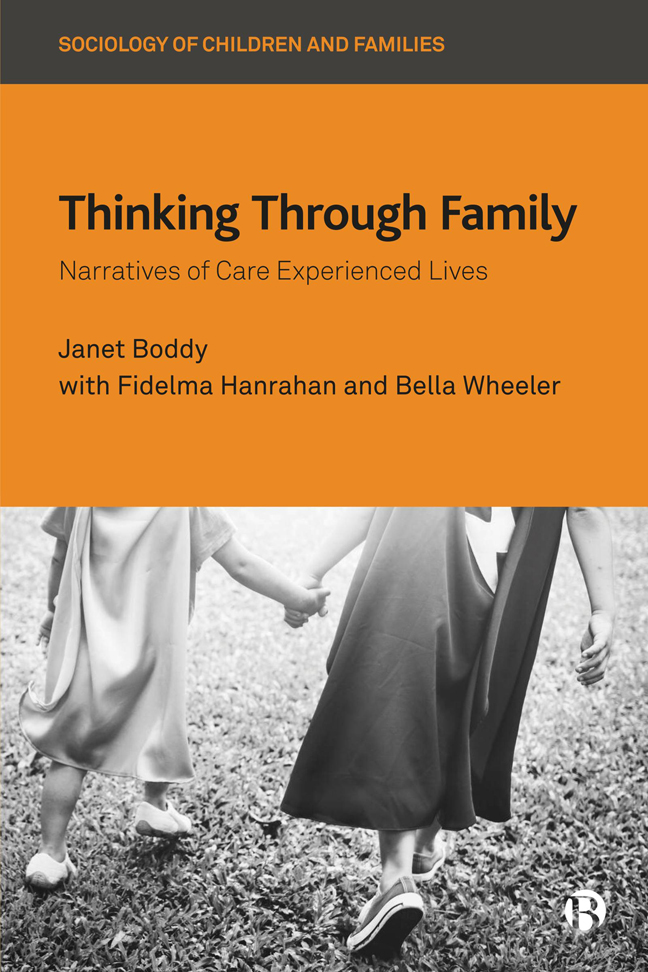Book contents
- Frontmatter
- Sensitive Content in this Book
- Dedication
- Miscellaneous Frontmatter
- Contents
- List of Figures and Table
- Acknowledgements
- 1 Why Think Through ‘Family’?
- 2 Learning From Care Experienced Perspectives
- 3 Doing Family: The Significance of the ‘Ordinary’
- 4 Re/Configuring Boundaries: Who Counts as ‘Family’?
- 5 ‘How Can We Not Talk about Family When Family's All That We’ve Got?’: Care and Connectedness
- 6 Understandings and Experiences of Parenthood
- 7 Thinking Through Family: Implications for Theory and Practice
- Notes
- References
- Index
2 - Learning From Care Experienced Perspectives
Published online by Cambridge University Press: 24 January 2024
- Frontmatter
- Sensitive Content in this Book
- Dedication
- Miscellaneous Frontmatter
- Contents
- List of Figures and Table
- Acknowledgements
- 1 Why Think Through ‘Family’?
- 2 Learning From Care Experienced Perspectives
- 3 Doing Family: The Significance of the ‘Ordinary’
- 4 Re/Configuring Boundaries: Who Counts as ‘Family’?
- 5 ‘How Can We Not Talk about Family When Family's All That We’ve Got?’: Care and Connectedness
- 6 Understandings and Experiences of Parenthood
- 7 Thinking Through Family: Implications for Theory and Practice
- Notes
- References
- Index
Summary
Is the possession of a terrible tale, a story of suffering, desired, perhaps envied, as a component of the other self? … To do with a bourgeois self that was told in terms of a suffering and enduring other, using the themes and items of other, dispossessed and difficult lives.
Carolyn Steedman, Feminism and Autobiography: Texts, Theories, Methods, 2000, p 36Hearing a different story?
In Chapter 1, I drew on Adichie's (2009) discussion of the Igbo word ‘nkali’ to argue for the need to move beyond a troubled ‘single story’ of family for people who have been in care, recognizing dynamic complexity and diversity – and strengths as well as challenges – in order to avoid reinforcing stigmatizing binaries. This was an explicit focus of the Against All Odds? study, as our research team has written elsewhere: ‘If care experienced people are predominantly viewed (and studied) through a problem-focused lens, policy and professional approaches may become dominated by an inadvertently stigmatizing hegemonic discourse, focused on measurable risks and outcomes’ (Bakketeig et al, 2020, p 1). As we discuss in that paper, there is substantial international evidence that care experienced people face heightened risk of disadvantage across domains including education, employment, housing, financial security and health (for example, Stein and Dumaret, 2011; Courtney et al, 2011; Kääriälä et al, 2018; Häggman-Laitila et al, 2018; Berlin et al, 2021). Research on risk of disadvantage is hugely important in highlighting support needs for young people in and after care (and so informing the development of policy and professional frameworks), but we would add a note of caution. If research focuses only on risk, it may have the unintended consequence of exacerbating stigma: complex and diverse lives may be reduced to hegemonic narratives of the vulnerable or damaged subject. A growing body of work has documented the heterogeneity of care experienced lives, for example, modelling the relative contribution of experiences pre-care and while in placement (for example, Fowler et al, 2017; Rebbe et al, 2017) and illuminating the ways in which care systems may be protective for young people (for example, Arnau-Sabatés and Gilligan, 2015; Sebba et al, 2015; Holmes et al, 2018; Hanrahan et al, 2020). These studies demonstrate the value of building understanding of dynamic complexity and diversity – as we also aim to do in this book.
- Type
- Chapter
- Information
- Thinking through FamilyNarratives of Care Experienced Lives, pp. 18 - 42Publisher: Bristol University PressPrint publication year: 2023



